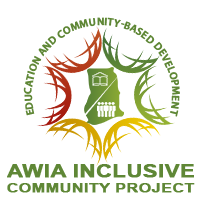Volta Region : HAVE - The School of Joy
Multifunctional Disability Centre
Opening of a Multifunctional Disability Centre in the rural village of Have, Volta Region, Ghana, to give the possibility of permanent educational and recreational support to physically and psycho-physically handicapped children and adolescents from the villages in the area, in order to allow a path of social and scholastic inclusion in an environment that fosters significant emotional and educational relationships; the Centre is designed to become a point of reference for the communities in the selected area as the promoter of educational, cultural and social gathering initiatives.
Unfortunately, traditional local culture is deeply rooted in stigmatizing disability, which is ostracized and sometimes actively suppressed. Nowadays mentalities are changing but there is still much to be done to educate families and the communities about a different vision of disability.
In this context the NGO Awia Inclusive Community Project (AICP), jointly with the partner NGO Give a Dream Foundation, intends to carry out a Multifunctional Disability Centre which should become a hub of educational initiatives for local communities with particular reference to the social and scholastic inclusion of disabled minors.
General purpose: to give children and adolescents and their peers with disabilities a reference place where to meet and play, do educational and recreational activities together in order to produce a change in the perception of disability and handicap within the family and the community.
- Perception of disability and handicap at family and community level
- The disabled depository of dignity and rights
- Social inclusion of people with disabilities
The logic of the activities that will be proposed is to experience a new awareness of human relationships and diversity.
Final Recipients
The Multifunctional Disability Centre will extend its action in an area which includes 25 communities that are part of Have Traditional Council, whose total population is approximately 3,500 inhabitants.
The final recipients of the project will mainly be disabled children and adolescents, but the research and awareness-raising work will concern the communities as a whole and the authorities of the villages and the District.
In particular, 105 disabled children not attending the school are distributed in the area, of whom 42 live very far away from where the Centre will stand (around 5 km), therefore we have planned to buy a second-hand minivan to take them to the Centre and back home.
Sustainability of the minivan: the van shall work as public transport after bringing the disabled children to school in order to gain funds for maintenance and fuel.
The Intervention Strategy: Methods and Actions
1. Research and Awareness
Beyond the Handicap: from Disabled to Differently Abled
The project includes a preliminary study (already underway) in the chosen area with competent local staff to classify the type of handicap and the degree of integration of each subject in the family and community context. During the research, contacts will be established with the communities through awareness-raising meetings in order to produce a change in the perception of disability and handicap within the families and the communities themselves.
For each individual case of disability, specific activities will be studied to be carried out together with peers, family and community.
The link with the communities will be maintained through periodic meetings to raise awareness and monitor the results.
2. Educational/Recreational Activities
Educational and recreational activities at the base of the childrens’ path will be carried out in groups to enhance collaboration and mutual support. The activities will offer opportunities for:
- improving the functional and educational activities of disabled children
- creating communication and socialization opportunities
- improving relationships between minors with disabilities, family members and the community
- breaking the barriers due to stereotyped attitudes
- increasing awareness of disability and the potential of disabled people at various levels, family, social, school, community
3. Activities with the Minors
- Daily school activities and literacy
- Daily expressive activities: music and development of artistic skills. Part of these activities are related to the cultural and ritual life of the area
- Organization of supplementary recreational activities based on the interests, passions and attitudes of the children
4. Networking Activities
Networking activities will be carried on both on the formal network (schools and local teachers) and informal (family and community level) in order to raise awareness of the importance of inclusive education, share some operational tools and finalize interventions in favour of disabled minors.
The association will, on the one hand, maintain contact with the families of the assisted children in order to involve them and make them responsible for the support process, on the other it will involve the children and their families in the numerous initiatives organized by Awia Inclusive Community Project, such as parties and events, also linked to the ritual life of the community.
5. Child Sponsorship
AICP sets up child sponsorship programs for less privileged and disabled minors to provide for their needs and the purchase of disability aids
6. Building of Spaces
Available space:
140 by 200 square meters of land are available to accommodate the building structures.
Spaces to build:
- 6 classrooms with disability-friendly facilities are needed to provide adequate learning spaces
- 4 dormitories (2 for boys and 2 for girls) of 25 places each with toilets especially for the disabled are needed for the accommodation of disabled minors who cannot move back and forth daily
- 1 kitchen with pantry, 1 office, 1 big triple bedroom and 1 bathroom for the staff on duty
- 1 small first aid medical dispensary
Currently, only 3 of the 105 disabled children distributed in the area attend school every day; we expect to have the Centre ready by the end of 2024.
